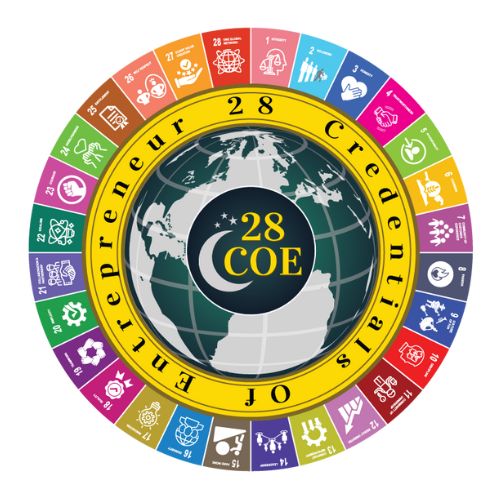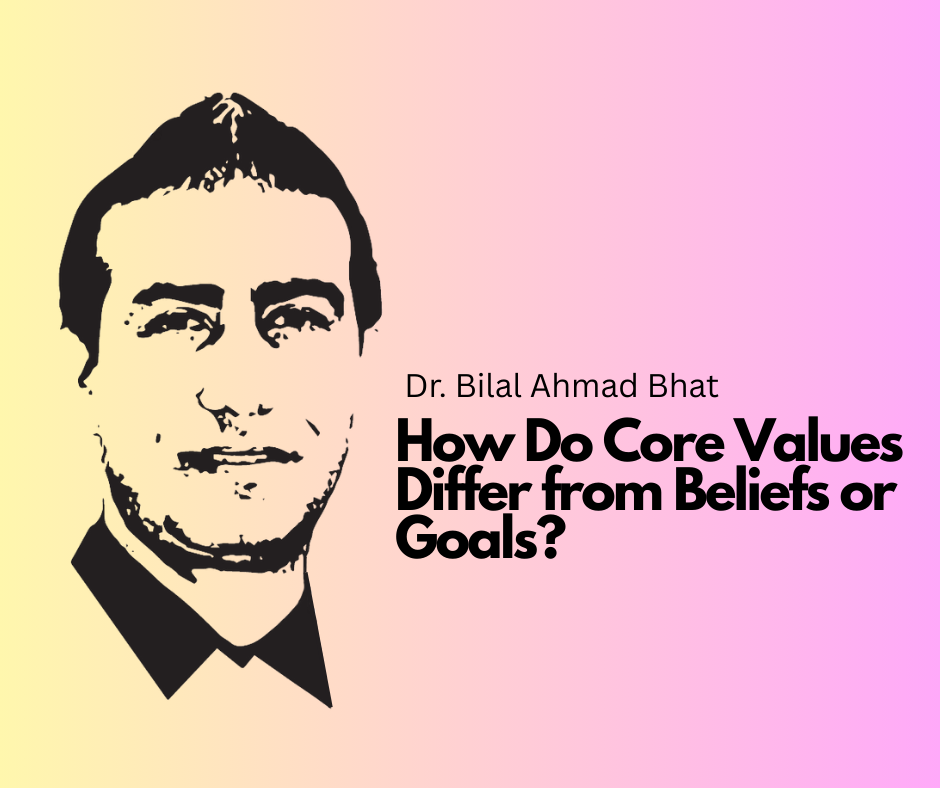How Do Core Values Differ from Beliefs or Goals?
By Dr. Bilal Ahmad Bhat
Global Leader | Founder of BAB Group of Companies | Author of 28COE Core Values – Edition 1 | MLA Candidate at 32-Pampore Constituency, 2024
In the realm of leadership, entrepreneurship, governance, and personal development, a recurring question often arises: How do core values differ from beliefs or goals? This question is not only philosophical but highly practical, especially for startups, communities, and political leadership. As someone who has founded multiple startups, participated in elections, and authored the globally recognized “28COE Core Values,” I, Dr. Bilal Ahmad Bhat, have experienced firsthand how these three foundational concepts — values, beliefs, and goals — guide human action. But while they often intersect, they serve distinct purposes.
Core values are not just philosophical ideals. They are fundamental guiding principles that dictate behavior, build culture, and influence long-term sustainability. During my candidacy in the 2024 Assembly Election from 32-Pampore Constituency, I observed that while beliefs can vary and goals can shift, core values remain constant, acting as a moral and strategic compass. Let’s break this down to understand how each functions independently, and why knowing the distinction is crucial.
1. Understanding Core Values
Core values are deeply held principles that form the ethical and behavioral foundation of individuals, organizations, and communities. They answer the questions:
- What do I stand for?
- What is non-negotiable in how I live or lead?
Examples include:
- Integrity
- Respect
- Responsibility
- Empathy
- Innovation
- Sustainability
As the author of the 28COE Core Values, I emphasized values that are globally relevant and timeless, empowering thousands of leaders, professionals, and entrepreneurs to build ethical and purpose-driven frameworks for their lives and ventures. Core values do not depend on external achievements — they are who you are, not just what you do.
2. Understanding Beliefs
Beliefs, unlike values, are subjective convictions or mental acceptance of certain facts, ideas, or ideologies. These often stem from cultural, religious, educational, or personal experiences. Beliefs influence how you interpret the world but are more flexible and situational than core values.
For example:
- Belief: Education is the key to success.
- Belief: Hard work always pays off.
- Belief: Technology will solve most human problems.
While beliefs can guide decisions and shape attitudes, they can change over time when new evidence or experiences arise. Core values, however, should remain stable and consistent — forming the unshakable core of your identity and leadership style.
3. Understanding Goals
Goals are specific outcomes or achievements that one aims to reach within a defined timeframe. They are measurable, tangible, and action-oriented. Examples include:
- Increasing sales by 50% within one year
- Winning an election
- Launching a new tech product
- Building 100 schools in underprivileged areas
Goals serve as destination markers, while core values guide the journey. It is entirely possible to achieve a goal in a way that violates your values — which is why value-driven leadership is essential. During my political campaign, my goal was to serve the constituency, but it was my core values — transparency, accountability, and service — that dictated how I pursued that goal.
4. The Relationship Between the Three
Think of this analogy:
- Core Values are the compass
- Beliefs are the map
- Goals are the destination
You may change your map based on the terrain (beliefs) or update your destination (goals), but your compass (core values) should always point in the same direction.
In both politics and business, I have witnessed people achieve their goals but lose trust, respect, or community — because they compromised their values. That’s why at the heart of everything I do — from the BAB Group of Companies to the 28COE movement — lies an unwavering commitment to core values.
5. Why Knowing the Difference Matters
- Personal Clarity: Understanding the differences brings clarity in decision-making, especially in moments of crisis.
- Leadership Authenticity: Leaders who live by core values inspire trust, while those who rely solely on beliefs or shifting goals may lose credibility.
- Organizational Culture: In startups or political campaigns, clear values drive team alignment. Without this, conflicts increase.
- Conflict Resolution: When disagreements arise, referring back to shared values — not differing beliefs or goals — can help find common ground.
- Community Building: As I saw during my campaign in Pampore, communities built on shared values unify faster and last longer, even if individual goals or beliefs differ.
6. Case Study: 28COE Core Values Movement
What makes the 28COE Core Values impactful globally is their universal applicability. Thousands of people across 100+ countries — leaders, CEOs, educators, students, activists — practice these values in their personal and professional lives. I invited leaders from around the world to contribute to the book with one quote on one value, creating a collective mosaic of wisdom. You can explore this global collaboration at www.28coecorevalues.com.
Conclusion
While beliefs and goals play vital roles in shaping perspectives and achievements, core values are the non-negotiables that define your identity and legacy. They are not just motivational posters or slogans — they are the spiritual DNA of who we are as humans, leaders, and communities. Whether leading a startup, a community, or a nation, we must be rooted in timeless values that drive ethical behavior and sustainable progress.
As I often say:
“Your core values are your soul’s signature — never compromise them for temporary applause.”

